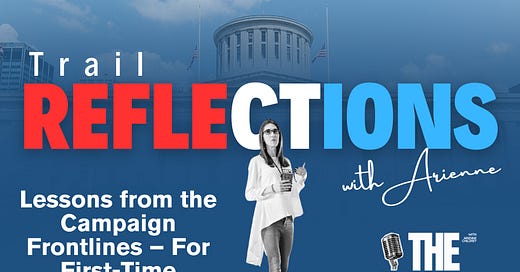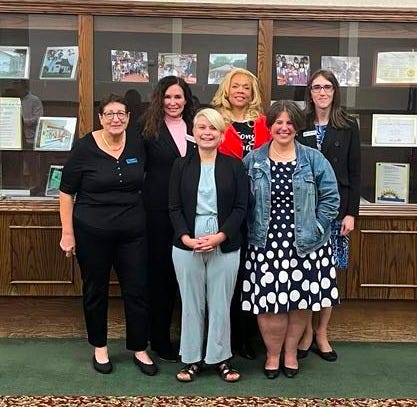Being a first-time political candidate isn’t for the faint of heart. You’ll be battling expectations, navigating sudden surprises, and getting scrutinized like never before. Trust me, I’ve been there. And while there’s no way to prepare for every twist, here’s what I’ve learned to keep the wheels on track — and sometimes even moving forward!
1. Know Your “Why” (And Make It Memorable)
Every voter, journalist, and county party committee member you meet will ask why you’re running. If your platform is about what you oppose, great — but make sure you also clearly communicate what you stand for and how you plan to lead differently. Focus on differentiating yourself from your opponent and explaining how your policies are a better fit for the district.
2. Do Your Homework
You don’t need to know everything about every issue, but you do need to show up informed and prepared to listen. Study the demographics of your district and make an effort to understand their concerns. If a voter brings up a topic you’re not familiar with, be honest, commit to researching it, and follow up. It’s not weakness; it’s respect.
3. Pace Yourself — Campaigns Are Marathons, Not Sprints
It’s natural to be fired up when you start campaigning. But if you dump all your energy early on, you’ll struggle to maintain enthusiasm when it really matters. Similarly, don’t host major events too early unless there’s a solid fundraising angle. Most voters tune in after primaries, so work on building momentum instead of burning out.
4. County Parties Are Your Best Allies
Building relationships with county Democratic parties, especially in rural districts, is vital. They might be cautious about endorsing a newcomer, but with good reason — they’re protective of their resources. Work with them, attend their events, and use their networks to boost fundraising. Make yourself known as someone invested in more than just a single election cycle.

5. Own Your Skeletons
We all have pasts. If you’ve got anything that might come back to haunt you, get in front of it. Incorporate your mistakes into your messaging and frame them as lessons learned. It’ll soften the blow when opponents inevitably dig up dirt — and it shows you’re transparent and human.
6. Master the Social Media Maze
Develop dedicated campaign accounts on platforms relevant to your voter base. Lock down your personal profiles or prune your friends list. Trolls will appear — you’ll have to decide whether to engage, ignore, or block them. Just remember that if you’re not an incumbent, you have more flexibility in setting your own boundaries.
7. Be Media-Savvy
Getting attention in rural districts can be tough. Send press releases about campaign events and public statements on hot topics. If your opponent gets coverage, there’s a good chance local outlets might include your perspective, too. Persistence matters.
8. Build a Network with Other Candidates
Connecting with other candidates — even those outside your district — can be invaluable. Share strategies, support each other, and learn from their experiences. Attending party-sponsored events boosts both your reputation and visibility.
9. Rally Your Core Team
Campaigns are fueled by volunteers. Not all will stick around, but those who do become your lifeline. Lean on them, appreciate them publicly, and insist they take needed breaks. Exhausted volunteers can’t support you effectively.
10. Take Care of Yourself
Yes, it’s a tough race. But you need breaks. Step away from time to time, even if just for a weekend. Staying grounded is crucial to avoid burnout.
11. Prioritize Strategic Community Events
You won’t be able to attend every community gathering — pick wisely. Make sure to hit important county fairs; they’re excellent opportunities to meet voters without having to chase them down. Plus, having a presence at your county Democratic booth allows voters to come to you.
County fairs are more than just nostalgic summer traditions; they’re a goldmine for campaign opportunities, especially in rural areas. These events bring together a cross-section of the community, from farmers and families to small business owners and young people. They provide a chance to connect with constituents face-to-face, allowing you to present your ideas in a friendly, approachable environment. Here are some strategic advantages to focus on:
- Visibility and Accessibility: Unlike town halls or door-to-door canvassing, county fairs naturally draw in crowds. This provides a high-traffic environment where candidates can shake hands, answer questions, and share campaign literature with many potential voters over the course of a day.
- Community Engagement: Beyond campaign rhetoric, county fairs offer a chance to show you understand and appreciate local culture and traditions. Whether you're sharing a meal at a food stall, participating in a ribbon-cutting ceremony, or showing genuine interest in 4-H competitions, these moments make a strong, lasting impression.
- Support from the County Democratic Booth: Having a presence at the Democratic booth (or any relevant local party booth) is vital. It serves as a home base for distributing campaign materials, connecting with active party members, and organizing volunteer sign-ups. This presence shows commitment and helps build relationships with those invested in local politics.
When attending county fairs, emphasize listening to voters’ concerns and demonstrating that you’re not only interested in the big-picture policies but also care deeply about local matters. Engaging sincerely and with enthusiasm makes these events a campaign highlight.
12. Apply for the Endorsements:
Education organizations, unions, and Political Action Committees (PACs) are among many groups that may reach out with endorsement questionnaires as your campaign gains visibility. Endorsements serve a dual purpose: some may offer financial contributions to your campaign, while others can bolster your credibility. Be cautious when filling out questionnaires for groups that are overtly hostile or misaligned with your platform; it's okay to decline. For others, invest the time in thoughtful responses. Every endorsement is a powerful opportunity to showcase your values and demonstrate to voters who you stand with and what you’re fighting for. Even if no money accompanies an endorsement, its value in signaling your commitments and alliances cannot be overstated.
Final Thoughts: Listening and Staying Grounded
Running for office means showing up, listening, and making yourself heard. Not every day will be a win, but every interaction is a chance to connect and make an impact. I’m still learning myself, and I’d love to hear what worked for others. After all, running for office isn’t just about elections; it’s about building a community of like-minded changemakers.







